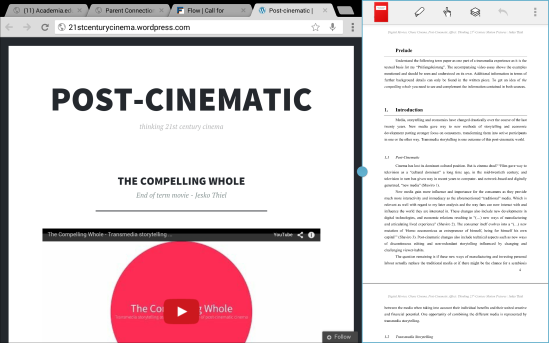
I have long been interested in “videographic criticism” — that is, scholarly (interpretive, argumentative, and sometimes more poetic) work done in the medium of sound and moving images. Such work is especially relevant for engagements with film and video, television, and video games — i.e. for the critical analysis of media that themselves operate with sound and moving images of various sorts. Until now, I have only dabbled in videographic criticism, but I regard it as an important means of gaining insight and materially grappling with moving-image media; the process of planning and executing a video essay can be literally eye-opening to students who are just coming to terms with concepts and practices of cinematographic framing and continuity editing, for example, but the experience is no less powerful for seasoned scholars who are used to engaging with moving images through the more conventional channel of written text.
Over the past few years, as a result, I have made a commitment to myself to work towards more fully integrating videographic modes and methods into my pedagogical and scholarly practice. I have encouraged students to produce video essays as seminar coursework (e.g. in my 21st-century film course) — and I have plans to expand my incorporation of such assignments in future courses. In the meantime, a great number of people have been busy developing the form, exploring best practices for conducting this type of work, and even setting up peer-reviewed journals for videographic criticism — if you haven’t seen it yet, be sure to check out the awesome journal [in]Transition. In other words, while this is still a relatively new field of scholarly publication (though it clearly draws on older forms of documentary and creative work), there is a growing community of people and a growing body of work and experimentation that can be drawn upon and learned from.
I am therefore very excited to be attending a workshop this summer, “Scholarship in Sound & Image” (June 14-27, 2015 at Middlebury College), where I look forward to meeting some of these people and learning from their experience. Co-directed by Christian Keathley and Jason Mittell, and with guest presentations by the incomparable Catherine Grant and Eric Faden, the workshop promises to be a once in a lifetime learning event.
In other words: Expect to see more moving-image experiments on this blog!


